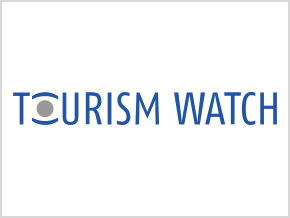Do we really measure what we value?
In the COVID-19 pandemic, indicators have gained new and key importance in supporting political decision-making. Over the past few months, different indicators to identify and fight the COVID-19 pandemic have taken centre stage in public attention. Reopening scenarios are tied to indicators which are updated on a daily basis. Benchmarks are agreed upon, on the basis of which political decision-making processes to deal with COVID-19 are initiated. By comparison, indicators to measure success in tourism do not appear particularly timely.
„Driving by sight while looking back“
Indicators such as the number of touristic guest nights or tourism expenditures are exclusively growth-oriented. They do not say anything about efficiency, quality, value added, or distribution and are therefore inappropriate to evaluate developments. It would be like measuring personal success on the job by counting the number of days at work without looking at the actual performance delivered.
The established indicators used to measure success in tourism have been criticised for decades. Since 2015, when the Sustainable Development Goals (SDGs) were adopted, the UN World Tourism Organization (UNWTO) has finally embarked on a critical discussion. With the initiative “Measuring the Sustainability of Tourism“, UNWTO aims to develop a new globally applicable statistical framework focussed on sustainability. The COVID-19 pandemic speeds up the debate on sustainability assessments, as concepts such as resilience and the ability to manage crises are gaining importance as elements of sustainability.
Redefining the value of tourism
There are various research programmes and approaches to measurement. They provide evidence of how the concept of sustainability can be captured and assessed in quantitative terms. As part of my academic research I conducted a systematic evaluation of the literature encompassing more than 80 tourism-specific sustainability assessments. It confirms, though, that there is above all a lack of recognised sector-specific frameworks for suitable indicators: Indicators are not linked to respective targets and existing reference systems such as the SDGs are not taken into account.
If tourism is to contribute to a desirable and sustainable future, the degree to which it does so, needs to be measured. Otherwise “sustainable” remains a hollow term devoid of meaning. Recent indicators often strongly focus on economic growth-related concerns and mainly provide simple volume-based information. They are not suited to derive references to a desirable future worth living, as they remain singular and are not being connected with a problematic state of the system that is to be improved.
Indicators for sustainable destination management
In the context of destinations, meaningful indicators should above all determine the (potential) contribution of tourism activities to the sustainability of the respective region. In very tangible terms, for instance, economic indicators should give information on the extent to which tourism generates income and on how this income contributes to the economic prosperity of the region. This may, for example, be assessed by indicators such as value added, job creation, or tax revenues generated by tourism. To assess environmental factors, data for more complex indicators should also be gathered, for example to assess resource efficiencies. Here, the value added is put in relationship to environmental consumption such as the carbon footprint or energy consumption, providing an indication of a potential resource decoupling. Positive ecological impacts of tourism, for instance, refer to the creation and conservation of protected areas, which serve the protection of nature and wildlife while being tourist destinations at the same time. Especially at destination level, qualitative assessments should also be applied, for example by conducting surveys among the local population or employees in tourism in order to obtain information on aspects like the acceptance of tourism and the real effect of tourism on job creation.
Reassessing business success
At business level, indicators are gaining relevance, which allow for new ways of looking at the value added of enterprises. Recent emerging concepts such as the “shared value concept“ by the economists Porter and Kramer or ”transformative resilience“ share the common idea of a broader understanding of value creation by enterprises. Apart from business profitability, this also includes indicators on enhanced environmental and social effects. It also identifies risk factors such as leakages and capital dependencies. Initiatives such as B-Corporations or the Economy for the Common Good implement such ideas and support companies in the development of holistic sets of indicators.
Political support is needed
A new age of sustainability assessments requires new quality of data availability and new methods of data collection. We are in a need for additional political support to expand official statistics, and to put obligations on businesses to report more comprehensively with regard to environmental flows or supply chain management.
It is not just due to COVID-19 that tourism needs a new compass, which will help to navigate around impending crises, to identify its own vulnerabilities, and to maintain the basic direction of sustainable development in general. Now, in times of direct threats to economic survival due to lockdowns and travel restrictions, there is a need for well-conceived programmes, which combine urgent economic support with future perspectives and support these with robust indicators. Indicators that do not present tourism as an engine of growth, but as a catalyst for prosperous living environments show a way out of the crisis and towards a more sustainable, more resilient future.
English translation: Christina Kamp
Further information:
The Low-Carbon Imperative: Destination Management under Urgent Climate Change. Von Stefan Gössling & James Higham. In Journal of Travel Research, 2020.
Tourism, Resilience and Sustainability: Adapting to Social, Political and Economic Change. Von Joseph M. Cheer und Alan A. Lew (Hg.). Routledge, 2017.
Move Over, Sustainable Travel. Regenerative Travel Has Arrived. In New York Times. Von Elaine Glusac. 27. August 2020.
Why sustainability assessment? Von Robert B. Gibson. In Sustainability Assessment. Pluralism, practice and progress. Von Alan Bond et al. (Hg.). Routledge, 2013
Creating shared value. Von Michael Porter und Mark Kramer. Harvard Business Review, 89 (1—2), S. 62—77. 2017




